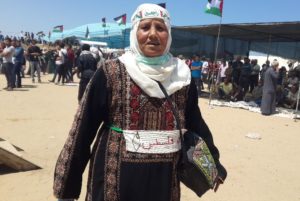A Dictionary of Media Terms for the Palestine/Israel ‘Conflict’

A Palestinian woman is taking part of the Great March of Return in Gaza on the 70th anniversary of Nakba
Roger Sheety writes in The Palestine Chronicle:
What is the point of journalism if not to question, doubt, and challenge state or elite power? If a journalist merely reports the standard talking points of that power (as most corporate media journalists do), isn’t he or she simply perpetuating the basic premise of those talking points, that all is fundamentally well with the status quo? How, then, can such a stance be thought of as fair, objective, or impartial?
The following piece is partially indebted to John Ralston Saul’s “The Doubter’s Companion: A Dictionary of Aggressive Common Sense”, which itself was partly inspired by earlier dictionaries such as those by Samuel Johnson and Ambrose Bierce.
The aim of these anti-dictionary dictionaries was to challenge and mock conventional wisdom and use language to clarify and communicate rather than the opposite.
As Saul eloquently puts it:
“In the humanist view, the alphabet can be a tool for examining society; the dictionary a series of questions, an inquiry into meaning, a weapon against received wisdom and therefore against the assumptions of established power. In other words, the dictionary offers an organized Socratic approach.”
But my main source of inspiration must go to the mainstream corporate media whose obfuscation, censorship, propaganda, hypocrisy, and outright lies in the service of state and elite corporate power—particularly on the Palestine issue—for decade after decade is really something to behold. It must truly be hard work to constantly not report the obvious, to use language to confuse rather than to clarify, to fabricate and perpetuate myths, and to de-contextualize what calls out for context.
Thus, in no particular order:
The Peace Process (Oslo, 1993 to the present time version): A failed attempt to convince the Palestinian people that their violent dispossession and ethnic cleansing from their homeland is just, legal, and sanctified. The first peace process began in 1919 when the World Zionist Organization presented its map of peace at the Paris Peace Conference. This map of peace included the WZO’s peaceful colonial wish to take all of Palestine, southern Lebanon, Syria’s Golan, parts of Egypt’s Sinai, and parts of western Jordan to create a “national home of the Jews.” Rejected by European elites at the time, they would soon after consent to the theft once British and French colonial rule over the entire Arab world was established and consolidated.
